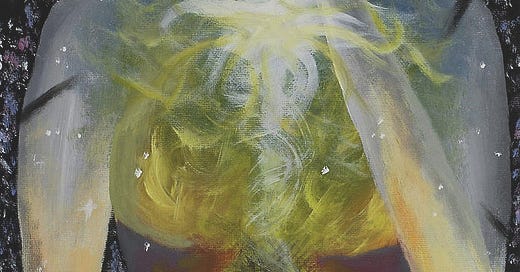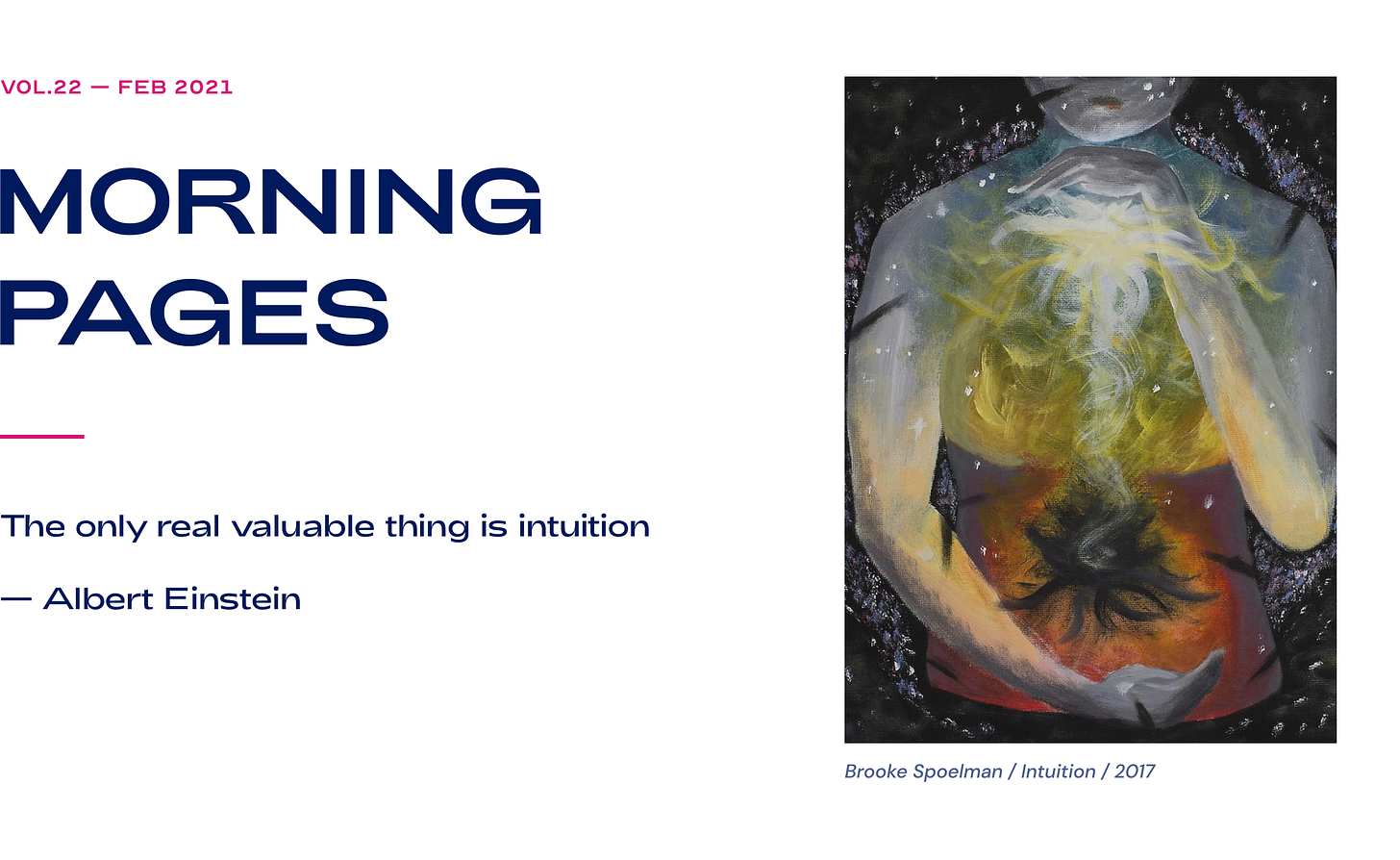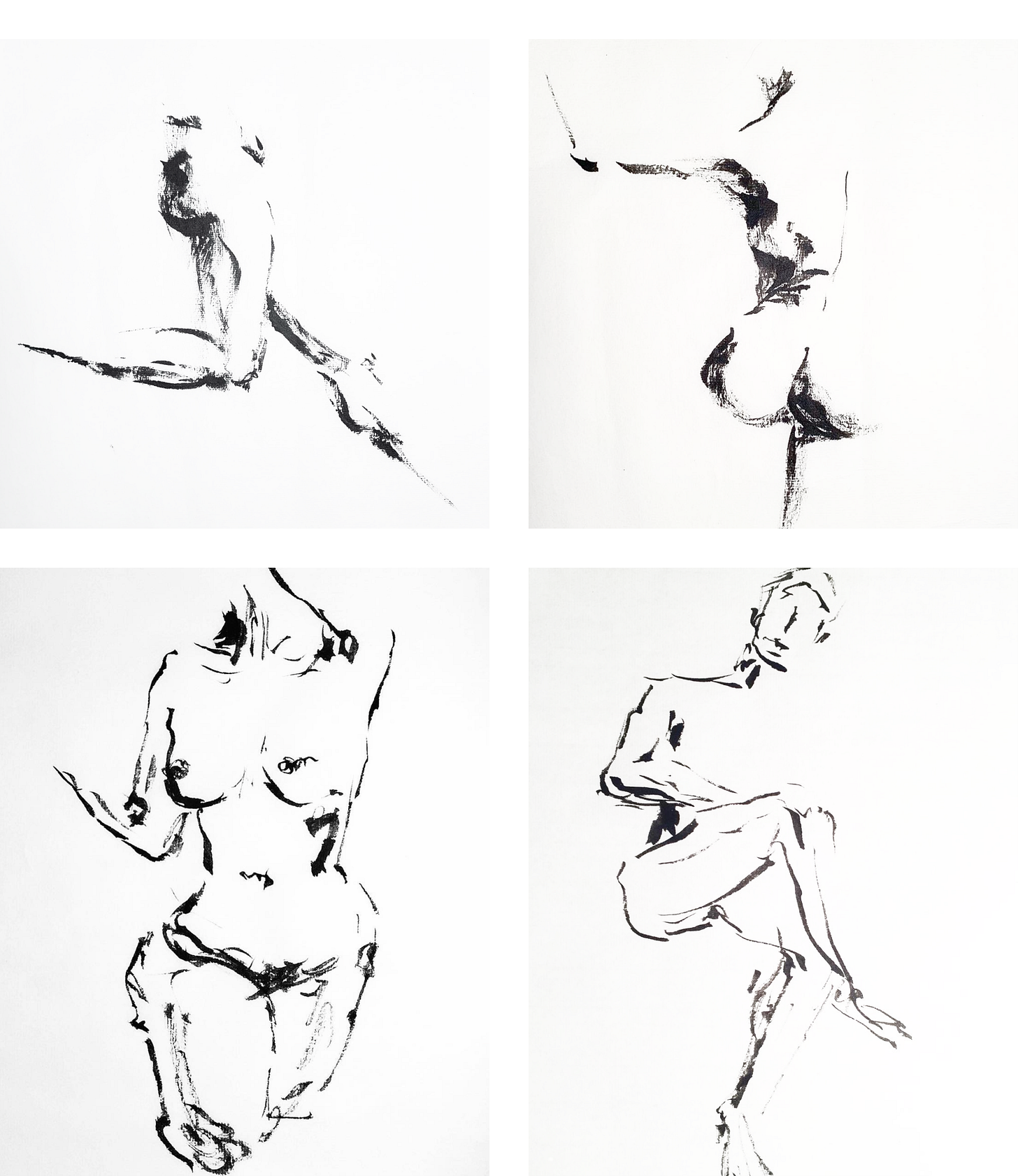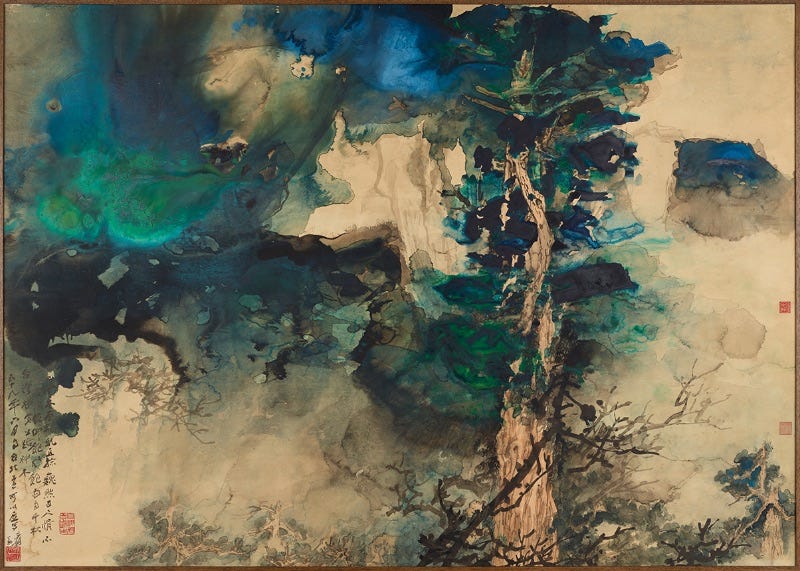Welcome to the 22nd volume of Morning Pages, a newsletter sharing inspirations to help you cultivate creativity and fulfillment in life.
A few weeks ago, I joined two lovely hosts Aga Szóstek and Lukasz Szóstek on their Season 8 podcast of Catching the Next Wave. The theme of the season is Intuition.
In the interview, I talked about my relationship with intuition, how I apply it in my work, and practical ways to tap into our intuition more often.
Here are some highlights from the interview.
Aga: What is your relationship with intuition?
Yuan: For me, I don't use intuition as much as I would have liked in my practice. I coach and I also make art and paint.
I have been learning to use intuition more in my coaching practice, which means that a lot of times when you're in a conversation with your client, hearing what they're saying. It's not about the problems they are talking about. If you were to use your intuition, it's more about sensing how they're feeling, what energy level they are at. And beyond the words, their body language and their gestures, and the small things that you're using your intuition to comprehend.
Leading more with my intuition is something that I am still learning as a coach. Of course, there are tools, strategies, and more analytical things that you can bring to these conversations, which could be also very helpful. But I do believe that in these types of conversations, it's just really about putting a mirror in front of the clients and really help them see themselves more clearly. Make observations and reflect back to them, such as “I think your energy just light up when you were talking about this vision about your business.” Expanding someone’s awareness requires definitely intuition, not analytical thinking.
In my art practice, I think I have been much more in my head when I was making things. Before COVID, I've been doing a lot of figurative drawings in a live drawing studio. I had been doing that for almost two years. Every week I go and sit there for three hours and draw figures.
It's something that I have really learned to observe about myself. I noticed that when my head was taking the lead, I was thinking, “okay, I'm going to draw it this way.” Usually, it does not work out very well. You could tell that I was thinking. My lines were not fluid and not clear.
The work that I'm most happy with is the ones that I did not think, at all. I was just focusing on the model, just do whatever I need to do, and let my hands and my body lead the way. It was always much, much better. I want to do more of that in my future practice.
Aga: What's the role of intuition in being a leader?
Yuan: Intuition is a type of thinking that as leaders, we underestimate how important it can be. We are trained to be rigorous and analytical. If you work with people day to day, you still need to follow your intuition and really understand how they're feeling and what they need.
A great leader knows when to have a balance between their analytical mind and their intuitive mind. They know intuitively when to use a certain type of thinking. They also know when to encourage others to think from their heart and their gut feeling.
Sometimes when we face more complex decisions, for example, a client had a few great offers that they are very excited about. All the numbers, the pros, and the cons laid out there. Then they’re confused, “How do I decide? All the options are really good.”
That's very much the analytical mind thinking about this. But if you were thinking in an intuitive way, maybe it's more about, “What does my gut say about this? Which one do I feel more aligned with when thinking about being in that environment?” These are the questions we don't ask often, but if you do, I think a lot of times you will get to that clarity much quicker.
It taps into that conscious intelligence. I think intuition is a form of intelligence. It is something that we could start to practice more and access more intentionally. Relying on both analytics and intuition helps leaders make more aligned decisions, not only for themselves but also for their teams.
Aga: If you were to think about inspirations of artists or designers who follow intuition, who would they be?
Yuan: One artist that I love is also from China. He's a very well known traditional Chinese painter. His name is Chang Dai-Chien/张大千. He has this practice which he named: Heart to Hand.
He basically is known for pouring ink onto a canvas. Very much following that intuition of trusting where the ink will go. Instead of trying to manipulating it, forcing it into some type of presentation. He just followed the heart and let the paint just express on the canvas. And the work itself is just very expressive and very free.
That's the type of art practice I'm trying to incorporate. Let go of where you think you want to end up, just let your intuition lead and trust the process. I think that's super inspiring.
I also wrote about Chang Dai-Chien in Vol 7: Heart to Hand
Aga: If you were to think about the most intuitive decision of your life, what would it be?
Yuan: Last year I left my job unexpectedly. I had a little bit of time to reflect upon what I want to do next. I took a very much following my heart type of approach. Because finally, I had this moment to reset and to really think about “If I were to really choose for myself, what do I want to use this time for?”
Becoming a coach to work with people that I love to support women of color and underrepresented minorities. That guided me into thinking, "Okay, now I can do this, but in the open and serve more people."
I think that was very much a following my gut feeling and my intuition decision. Because the rational mind was trying to convince me, "If you compare this approach to your old life, this is how much you're gonna lose." So there might be a lot of that that would just hold me from taking that bold step forward.
I was very much following where my heart wants me to go and how I was feeling. Because I believe that I needed a reset. I want to explore this different avenue of creating a business and not have my identity completely tied to an employer. I think that's something I have always been interested in exploring but wasn't able to. Because I was an international worker. I needed to have a visa and I couldn’t afford that. And now that I can. That was like a release, some kind of liberty.
Now I have this chance to really explore this. So I just decided to do it. ☺️
Thanks, Aga and Lukasz for being wonderful hosts. Beyond intuition, we talked a lot more in the full 52-min interview: overcoming the culture shock when I moved to the US, how organizations should cultivate belonging for people of color, and I also shared my commonplace book practice.
Thank you for reading this volume of Morning Pages. All views in this newsletter are my own. If you’re enjoying this newsletter and want to express your appreciation, spread the word and support the studio for the price of a cup of ☕️.
Yuan Studio is a space that explores the intersections of global cultures and identities. Currently, the studio is incubating a series of creative projects, such as Morning Pages, and coaching women and people of color to unleash their creativity and leadership potential. You can reach out on Twitter and LinkedIn.






